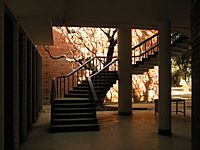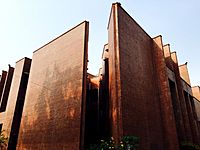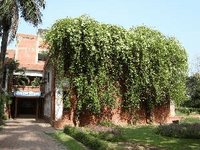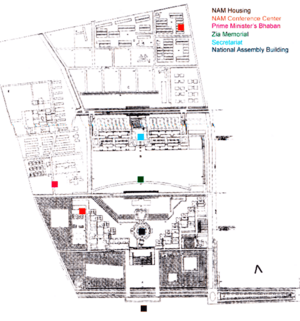Muzharul Islam facts for kids
Quick facts for kids
Muzharul Islam
|
|
|---|---|
| মাজহারুল ইসলাম | |
| Born | 25 December 1923 Murshidabad, British India
|
| Died | 15 July 2012 (aged 88) Dhaka, Bangladesh
|
| Nationality | Bangladeshi |
| Alma mater | University of Oregon Yale University AA School of Architecture |
| Occupation | Architect educator |
| Awards | Grand Master Award, South Asian Architecture Award Ceremony Independence Day Award |
| Practice | Vastukalabid |
| Buildings | Faculty of Fine Arts Jahangirnagar University Master Plan and designs Chittagong University master plan and designs Bangladesh National Archive |
Muzharul Islam (born December 25, 1923 – died July 15, 2012) was a famous Bangladeshi architect, city planner, teacher, and activist. He is known as the "Grand Master" of modern architecture in South Asia. He was a pioneer of modern architecture in Bangladesh and is often called the "father of Bengali modernism." His unique style greatly influenced buildings in Bangladesh during the 1960s and 1970s. He even invited major architects from the United States to work in Dhaka.
Muzharul Islam helped shape how architecture was practiced in Bangladesh. He did this through his own many projects and by inviting other famous architects. These included Louis Kahn, Richard Neutra, Stanley Tigerman, Paul Rudolph, Robert Boughey, and Konstantinos Doxiadis.
Contents
Early Life and Education
Muzharul Islam was born on December 25, 1923, in Murshidabad. He traveled to the United States in 1950. There, he earned his first degree in architecture from the University of Oregon.
In 1956, he received a special scholarship. This allowed him to study tropical architecture at the AA School of Architecture in London. Later, in 1961, he finished his advanced studies at Yale University. His teacher at Yale was Paul Rudolph. While at Yale, he met Louis Kahn and was classmates with Stanley Tigerman.
Muzharul Islam started his career in 1955. He designed two buildings in the Shahbag area of Dhaka. These were the Dhaka University Library and the College of Arts and Crafts. From 1958 to 1964, he worked as an architect for the government of East Pakistan.
Designing Important Buildings
One of his most important projects came about in 1959. At that time, the government decided that Dhaka would become the "second capital" of Pakistan. They planned to build a large capital complex in Sher-e-Bangla Nagar, Dhaka.
Muzharul Islam was asked to design the Jatiyo Sangsad Bhaban (National Assembly Building of Bangladesh). However, he decided to invite his former teacher, Louis Kahn, to take on this big project. Islam worked very closely with Kahn from 1965 until Kahn's death in 1973.
Besides Kahn, Islam also brought Paul Rudolph and Stanley Tigerman to work in Bangladesh. These three architects became known as the "American Trio." Islam's grand architectural style was very influential in Bangladesh from the 1950s onwards.
His major works include designing the master plans for Jahangirnagar University and Chittagong University. He also designed the Central Public Library, the Charukala Institute, and the Azimpur Estate. He planned the Rangamati township and several Polytechnic Institutes. Muzharul Islam also created the overall plan for Dhaka City. He even designed the logo for the government of Bangladesh.
Awards and Recognition
Muzharul Islam received many important awards for his work:
- In 1993, he was given the Gold Medal by the Institute of Architects, Bangladesh.
- He became an Honorable Fellow of the American Institute of Architects in 1999.
- He was an honorable member of the main jury for the first Aga Khan Award for Architecture in Geneva in 1980.
- He was also a judge for several national and international design competitions. These included the Aga Khan Award for Architecture and contests for the Faisal Mosque in Islamabad. He also judged designs for the headquarters of the Islamic Development Bank in Jeddah.
- In 1999, he received the Independence Day Award. This is the highest state award in Bangladesh.
A documentary film about Muzharul Islam was released in 2000. It was called Tini (The Architect) and was directed by Enamul Karim Nirjhar.
Notable Projects
| Year | Project | Image | Location | Notes |
|---|---|---|---|---|
| 1953–54 | College of Arts and Crafts |  |
Shahbag, Dhaka | |
| Dhaka University Library | University of Dhaka | |||
| Bangladesh National Archives and Library |  |
Sher-e-Bangla Nagar, Dhaka | ||
| 1962 | Housing for Class IV Employees | Azimpur Estate, Dhaka | ||
| 1963–64 | Railway Rehabilitation Zone | Khilgaon, Dhaka | This was a plan for the project. | |
| Rangamati Town | Rangamati, CHT | This was a plan for the town. | ||
| 1963–65 | BCSIR Laboratory Buildings | Dhanmondi, Dhaka | ||
| 1964 | National Institute of Public Administration Building | Shahbag, Dhaka | ||
| 1965–71 | Headquarters Building, Agricultural Development Corporation | Motijheel, Dhaka | A 14-story building. | |
| 5 Polytechnic Institutes | Rangpur, Bogra, Pabna, Sylhet and Barisal | He worked with Architect Stanley Tigerman on these. | ||
| EFU Building (Jiban Bima Bhaban) Project | Motijheel, Dhaka | A 27-story building. | ||
| Road Research Laboratories | Dhaka, Bangladesh | |||
| 1968–71 | Chittagong University master plan and designs | Chittagong University, Chittagong | He designed hostels, academic buildings, and staff quarters. | |
| Housing for Ruppur Atomic Energy Complex | Savar, Dhaka | |||
| Jahangirnagar University Master Plan and designs |  |
Jahangirnagar University, Dhaka | He designed hostels and staff quarters. | |
| 1980–84 | Jaipurhat Limestone and Cement Project | Jaipurhat, Bangladesh | This included a master plan, housing, a clinic, hospital, market, and mosque. | |
| National Library | Sher-e-Bangla Nagar, Dhaka | |||
| 1987 | Office Building for the World Bank | Dhaka, Bangladesh | ||
| 1995 | Garden City Project | Dhaka, Bangladesh | A 20-story building. |
Death
Muzharul Islam passed away on July 15, 2012, in Dhaka, Bangladesh. He was 88 years old.
Images for kids
See also
 In Spanish: Muzharul Islam para niños
In Spanish: Muzharul Islam para niños
 | Calvin Brent |
 | Walter T. Bailey |
 | Martha Cassell Thompson |
 | Alberta Jeannette Cassell |



